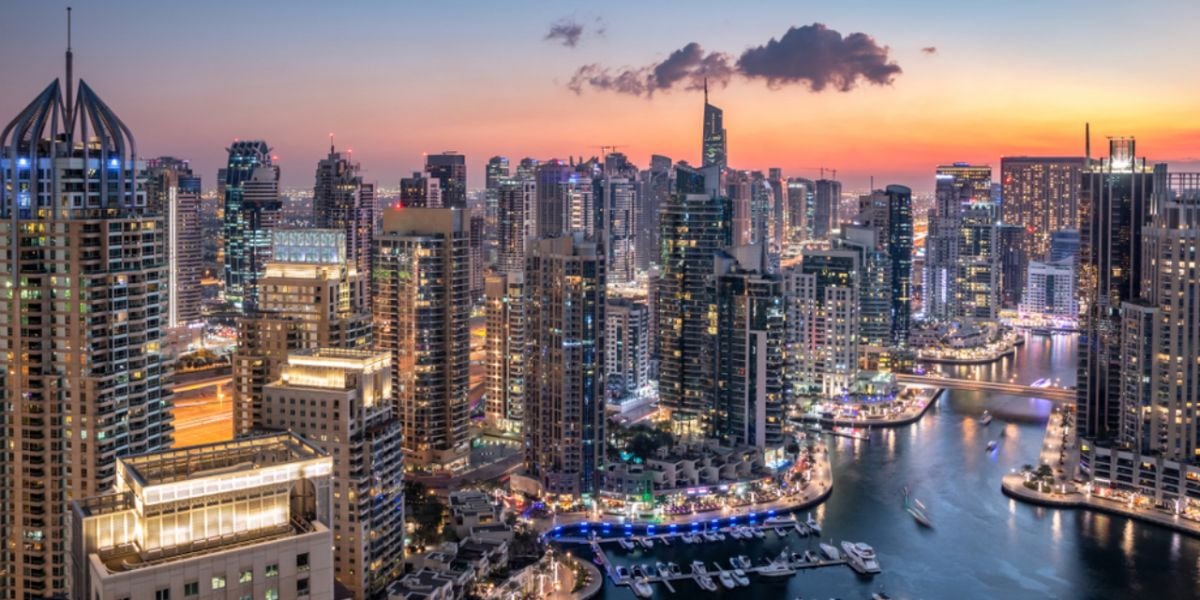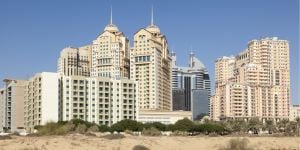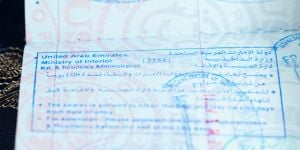
The UAE is a country with over 9 million expats — and this alone says a lot. Dubai is the country's most popular emirate and the number one destination when it comes to travel, business, and career-building. Over just a handful of years, Dubai has grown from a village in the desert to a modern city that frequently hosts prime events like the GITEX Global Tech Show.
Dubai's geography
The United Arab Emirates is located on the eastern side of the Arabian Peninsula, at the entrance of the Persian Gulf, and consists of seven emirates. These are Abu Dhabi, Dubai, Sharjah, Ajman, Umm al Quwain, Ras al Khaimah and Fujairah. Abu Dhabi, the capital city, is the largest among all the emirates. However, Dubai remains the most popular destination in the country. Dubai stretches over an area of 3,885 square kilometers and lies directly within the Arabian Desert.
Useful link:
The climate in Dubai
Dubai is, without any doubt, the perfect place to be for sunshine lovers. Blue skies, little rain, and year-round sunshine describe the city and the country as a whole. The United Arab Emirates has a desert climate with two seasons only: summer and winter. Summer starts in May and lasts until September. Daytime temperatures range from 39°C to 42°C (101 to 107°F). Summer is marked with hot and humid weather. It is perhaps the hardest time of the year. Luckily, buildings are air-conditioned; however, uncovered parts of the body can get heatstroke. You are therefore advised to protect your skin from the sun and drink as much water as possible. Sand storms make it more difficult as the wind brings hot sand from the desert.
Winter is a very popular season. The best time to visit Dubai is between October and April. The weather is mild, and the Gulf is perfect for swimming. Expect temperatures to range between 27°C and 28°C throughout the day, but at night it can go as low as 12°C. Around ten rainy days can be observed during the winter season. Foggy weather usually occurs, especially in the morning. The fog slightly disrupts road traffic, but it disappears once it starts becoming warm.
Wildlife and landscapes in Dubai
Dubai is home to some organizations like the Dubai Desert Conservation, which are dedicated to protecting the desert flora and fauna. You can, therefore, enjoy wildlife drives, camping, BBQ, and desert dinners there. Further away, Ras Al Khor Wildlife Sanctuary has one of the world's few protected areas with many migratory birds. Winter is the best time to visit pink flamingos there.
You can also find a lot of resorts in Dubai. These attract a lot of tourists all year round. However, winter is the best time to enjoy these as summer is scorching. Dubai is not only about sand. The city can also boast of its impressive green spaces. More and more parks are appearing in the city, like small oases in the middle of the desert, and are offering a lot of activities to the residents. Most of these parks are free of charge, and you can have a small picnic, gather with friends, or just rent a bike to explore them.
Useful links:
Dubai Desert Conservation Reserve
Ras Al Khor Wildlife Sanctuary
Cost of living in Dubai
With its ever growing popularity, it would come as no surprise that the cost of living in Dubai is regarded to be on the higher end. The emirate is known for its glitz and glamour, and this is reflected in the majority of amenities and services offered. While costs are considered high, living standards are of impressive quality to match, and salaries are usually adjusted to meet financial demand.
The average cost of living for singles ranges between AED 5,600 to AED 9,300; for a couple, it would be between AED 10,500 to AED 16,000, and a family of four can expect to pay AED 22,000 to AED 37,500 each month. This can vary, of course, depending on different factors, including:
Your accommodation
Where you choose to live will have a big impact on your monthly cost of living. For example, renting a townhouse in Dubai South can significantly reduce your expenses than if you were renting in Dubai Hills Estate.
Your commute
In addition to rental prices, you should consider proximity when choosing where to live. The distance of your commute, as well as your chosen mode of transportation, will also have an impact on your cost of living.
Recreation and lifestyle
Dubai is known for its attractive nightlife options, and going out frequently could put a dent in your monthly expenses. You will find, though, that there's generally a wide variety of options to suit all budgets. There are also a number of different services set up in Dubai to make day-to-day life easier, which can be very tempting to use, like cleaning, laundry, and spa services. While these are optional, they can significantly alter your day-to-day costs.
Your school choices
If you're moving to Dubai with children, you should consider that school fees will also impact your monthly spending. International schools are the most popular option, but tend to cost a little more. Public schooling in the UAE still needs to be paid for by expats, but is a lot more affordable.
Finding accommodation in Dubai
The growing number of tourists and expats in Dubai has created a demand in real estate, meaning you will have no trouble finding a place to stay when you move to the city. Whether you're looking to buy or rent property, the choices are endless.
It's worth noting that property prices have been steadily increasing as more and more people have flocked to the emirate for work. Despite this, there are always options available to suit both your budget and lifestyle.
Finding accommodation in Dubai is as easy as going online and searching through websites dedicated to real estate listings, such as Property Finder, Bayut, and Dubizzle.
If you're looking for lower rental costs, Jumeirah Lake Towers (JLT), Jumeirah Village Circle (JVC), and Dubai South all offer apartments, townhouses, and villas at affordable costs. If you're keen on embracing the luxurious Dubai lifestyle, areas such as Jumeirah Beach Residence (JBR), Downtown Dubai or Dubai Hills Estate might be more of an attractive option.
You can find out more about accommodation in Dubai through our detailed guide.
Useful links:
Getting around Dubai
Moving to a new place can be both exciting and a little scary at times, and trying to figure out how to get around could be quite daunting. Luckily, it's very easy to get around in Dubai regardless of how you choose to do it.
Public transportation is widely available and easily accessible. The use of taxis is very popular in Dubai, and you can choose between using the standard local taxi or more premium services. Local taxis, known as Hala Taxi, can be hailed on the side of the road, or at one of the many taxi stands found throughout the city. For added convenience, you can also book a Hala Taxi through the Careem app. For a little added comfort, you can also use both the Careem or Uber apps to book more premium ride options. Hala Taxi fares start at a minimum of AED 12 and run on a metre, while cars called from one of the booking apps can experience surge pricing during rush hour.
Buses are another mode of transportation that can be used in Dubai, and while popular for their low fares, they're also one of the slower options to getting around. In a fast paced city like Dubai, you'll find that more people would be inclined to use the metro and tram systems to get around. Dubai's metro system is well developed, with two lines that cover major points in the city. The trams are situated in a way which facilitates movements within certain areas, like Dubai Marina and JBR. Buses, metro, and trams can all be paid for through single-use tickets, or a reusable Nol Card.
If you're looking for a more unique way to get around the city, Dubai offers the exciting option to travel on water. Ferries are available with six different routes, and water taxis are a great way to beat the city's traffic. You'll find 40 different water taxi stations spread out across the city – it's definitely something that should be experienced at least once!
We've got a more detailed guide on transportation in Dubai to help you get around the city with ease.
Useful links:
Dubai's culture
Dubai's popularity has turned it into a melting pot of different cultures, attracting people from a vast number of different nationalities and backgrounds. Thanks to this, you'll be able to experience a mix of local culture, as well as be exposed to a lot of other different cultures from across the globe.
The emirate has naturally developed into a more modern place, where traditions and cultural norms of the locals can still be found but are not necessarily expected from its expat community. This means that while you will see locals dressed in their traditional clothing (white garbs called ‘Kandura' for men and more modest dressing for women), there is no expectation from the international community to follow the same. That being said, there are some areas (such as religious sites and government buildings) where modest dressing must be observed for both men and women. This means that women should keep their legs and shoulders covered, and men should avoid wearing shorts in these spaces.
You will also find that, despite it being a Muslim country, everyone is free to practice and express their own personal religion. There are numerous places of worship catering to different faiths, and the general population is incredibly tolerant of each other. You'll also be able to experience city-wide celebrations of popular religious holidays outside of Islam, such as Christmas and Diwali. As part of Muslim tradition and celebration, you'll also get a chance to experience Ramadan through annual tents set up where people can break their fast together, and Eid festivities.
You can manage your cultural expectations with more details highlighted in our guide to Dubai's culture.
Things to do in Dubai
The beauty of living in Dubai is that there is never a shortage of things to do, no matter what your personal interests are.
Avid shoppers will find that Dubai is a haven for big and extravagant malls, the most famous one being Dubai Mall. The latter is currently home to around 1,000 retailers and is a hotspot for residents and tourists alike. If you're not a fan of busy malls but still want a large variety to meet your shopping needs, the Mall of the Emirates is an ideal choice. Both Dubai Mall and Mall of the Emirates have direct metro access for ease of travel. If both of these options are still a little too crowded for you, you can opt to shop at the Ibn Battuta Mall, or the newly opened Dubai Hills Mall.
Dubai is the perfect place for sports enthusiasts, with a number of different daily activities and regular events to keep residents moving. There are plenty of running and cycling tracks spread out around the city to encourage a healthy lifestyle. You'll also find a diverse mix of fitness groups who regularly get together for workouts on the beach, and a growing number of gyms and other fitness facilities across the emirate. Dubai Fitness Challenge happens once a year, where residents are encouraged to complete at least 30 minutes of physical activity for 30 consecutive days. There are usually “fitness villages” set up during this time which hold free classes for everyone to enjoy.
Other attractions, such as the Museum of the Future, the IMG Worlds theme park, Global Village, and Dubai Safari Park will keep you busy throughout the year.
If you're looking to escape the city, the Al Qudra desert is a popular place to have a BBQ and camping day or book one of the many desert safaris Dubai offers.
We've put together a helpful guide of things to do in Dubai that you can read through.
Useful links:
We do our best to provide accurate and up to date information. However, if you have noticed any inaccuracies in this article, please let us know in the comments section below.








